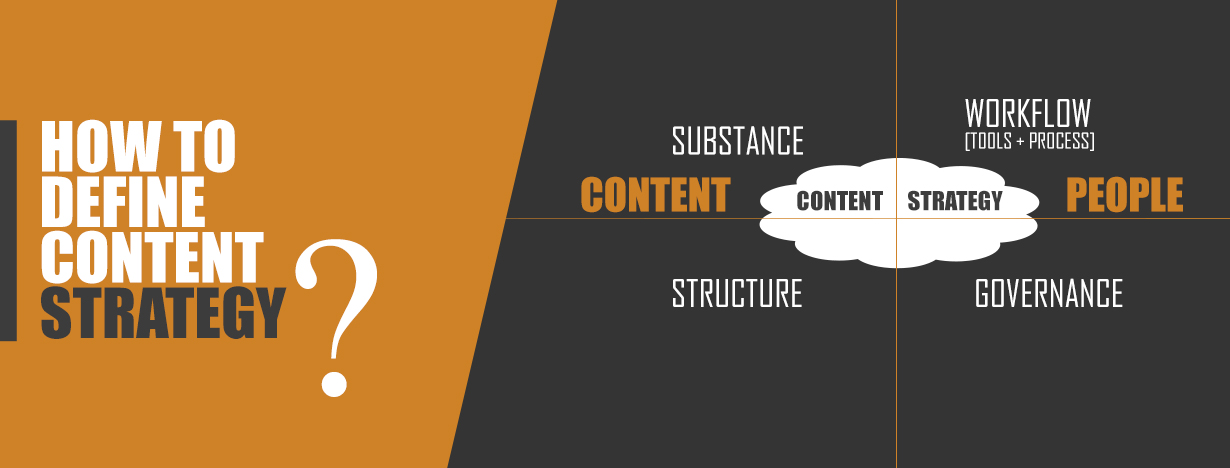Nowadays, businesses have already started going digital as they own a dynamic website, have themselves found on the Google maps and regularly post on social media. But, is that really enough? Certainly not! That was a 5-year old story and has now become obsolete in today’s ever-changing digital scenario. We as businesses need to step ahead – ahead of the traditional sheep mentality our competitors and everyone else is following.
Then, what do businesses really need? Well, the answer is ‘A Content Strategy’…
“Without strategy, content is just stuff, and the world has enough stuff.” – Arjun Basu
How to define Content Strategy?
An ideal content strategy is defined as the one that creates, plans, executes and delivers the right content to the right customer at the right time. More so, it manages the content so that it remains relevant while the market trends and demands continue to evolve.
The real purpose of creating a good content strategy must always be to attract the business’s target customers by delivering engaging, reliable and meaningful content. There are no set parameters for creating a good content strategy. It may vary for all businesses, brands and products or services.
What ‘NOT’ to do?
Content strategy will never work out if businesses put themselves in the first place to serve their own needs and later try to convince customers with what they have for them. In contrast, it should be formulated around the customers to pinpoint their needs primarily and then identifying a way for meeting these needs in the best possible manner.
The Myth
Many small businesses believe that creating a content strategy is only for the big-shot giants with massive budgets. However, this does not hold true. Of course, it does require a substantial amount of time and effort in the beginning, but making a plan that aligns your business goals is definitely possible with the limited availability of resources.
Here is an interesting stat to consider:
The conversion rate of sites with and without content marketing strategies in place is 2.9% and 0.5% respectively. This means the sites who do content marketing have a higher conversion rate that is 6 times than the usual.
A content strategy must answer:
- Why is the information being provided?
- Who is it for?
- What is it about?
- Who is responsible to distribute the info?
- Where does it need to be circulated?
- When will it be used?
- How will the strategy be executed?
A well-structured content strategy will enable your marketing team to not only achieve the business objectives but also exceed them.
Here we would list down the top 3 reasons why all big and small businesses must say ‘yes’ to content strategy.
- Content is the King
While it is important that you are found when your customers look for you, it is also imperative to serve the most influential element i.e. the search engines. A sure shot way to reach a customer so that they know your business and brand is to be ranked in the searches. The impact of informative and relevant content is constantly surging.
According to a survey by Ascend2 Brand and its Research Partners in November 2016, 57% of marketers considered content creation to be the most effective SEO tactic. The ‘Keyword/Phrase research’ comes next gaining 49% of the total votes.
- Keeping customers engaged is no more a cakewalk
The habits of modern customers are changing immensely and keeping your customers attention for long has become challenging.
National Centre for Biotechnology Information has highlighted that the attention span of today’s customers has come down to only 8 seconds in 2015 as compared to 12 seconds in 2008.
A content strategy enables your business to curate customers with your content within the first few seconds of their checkout. This helps your content be liked and shared on a larger scale.
- Customers are vocal and social
The new-age customers, constituting a high percentage of millennials, are vocal about their experiences across all social channels. They do not consume content in silence, rather they consider people’s reviews, rely on personalized experiences and believe in authenticity.
Your business’s content strategy must carefully identify factors that help define customer journeys and experiences.
The bottom line
While there are plenty of other reasons behind why your business should have a clear and crisp content strategy, those listed above can give you a kick start in forming one. So, why wait? Document your content strategy today!
Whether your business is new to the digital world or has reached a point where you’re not sure how to go ahead – leave the job to the best.
Partner with a strategic digital marketing agency and invest in a sound content strategy that will ensure better results in lesser time and at an affordable budget.





















4 Responses